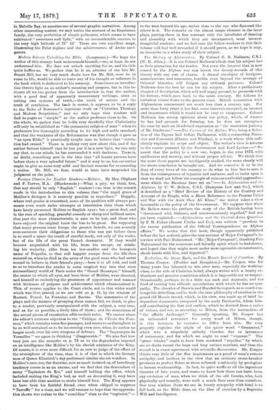Evolution, the Stone Book, and the Mosaic Record of Creation.
By Thomas Cooper. (Hodder and Stoughton.)—Mr. Cooper, who for many years has laboured to win over men, especially the working- class, to the side of Christian belief, always writes with a hearty en- thusiasm and genuine conviction which it is impossible not to respect. Occasionally, perhaps, he is a little too rash and dogmatic, and too fond of turning into ridicule speculations with which he has no sym- pathy. The theories of Darwin and Haeckel he regards as so much con- temptible drivelling, and he finds the true philosophy of creation in the grand old Mosaic record, which, in his view, was made up of brief in- dependent documents, composed by the early Patriarchs, Adam him- self contributing the first and earliest, which he derived from a series of visions, and not, as according to Milton, from the instructions of "the affable Archangel." Generally speaking, Mr. Cooper has an unbounded reverence for every word of Milton, though, in this instance, he ventures to differ from him. He very properly explains the origin of the queer word "firmament," which was a singularly unlucky blunder, due to ignorance of astronomy, and for which we ought to read "expanse." The "great whales" ought to have been rendered "reptiles," by which are no doubt meant the huge and long extinct saurians, and thus the record is in exact agreement with scientific discoveries. Mr. Cooper thinks very little of the flint implements as a proof of man's remote antiquity, and inclines to the view that an ordinary stone-breaker produces as perfect flakes as those referred confidently by geologists to human workmanship. In fact, he quite scoffs at all the ingenious theories of late years, and wants to know how there can have been any evolution of man, when we think of the old Greeks, who, both physically and morally, were such a much finer race than ourselves. Our true wisdom (here we are in hearty sympathy with him) is to fall back, as the Bible does, on the idea of creation by a Supreme Will and Intelligence.


































 Previous page
Previous page